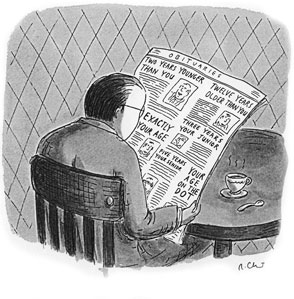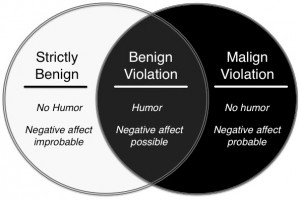I recently returned from the Humor pre-conference at the Society for Personality and Social Psychology. I got a chance to talk to Bob Mankoff, a cartoonist and the Cartoon Editor of The New Yorker. I asked him:
Why aren’t The New Yorker’s cartoons funnier?
(sic)
His answer is compelling. Yes, The New Yorker’s cartoons are intended to make you laugh, but they are selected to do more than that. In particular, the cartoons are intended to make you think (sometimes deeply). During Bob’s talk at the conference, he also mentioned that the cartoons need to be consistent with the editorial standards and tradition of The New Yorker, which are more subdued than that of, say, Mad Magazine.
…….. (Used with permission; http://rozchast.com/)
The subdued but thoughtful approach is also evident in The New Yorker’s caption contest. As a point of contrast, check out Daniel Radosh’s “anti-caption contest.” (Thank you Dick Thaler for bringing this to my attention). The anti-caption contest features a simple instruction: Submit the worst possible caption for this week’s New Yorker cartoon.
People allege that the the winning anti-caption is funnier than the winning caption at The New Yorker. It is also more likely to offend (and fail to meet the multiple editorial goals of the magazine). Consider the winning submission for this cartoon:
WINNER
I doubted your insanity defense, but I can clearly see your nuts.–wizaltSECOND PLACE
“When you say you’re ‘in really hot water right now,’ do you mean it in the I’m-guilty-of-murdering-my-wife sense?”– t.a.m.s.y.From http://www.radosh.net/
I will return later to discuss the differences more deeply, but if you are familiar with my emerging research on humor with Caleb Warren, you could see how a benign violation account illustrates how a cartoon could go too far or not far enough. On one hand, a cartoon can fail to be funny in that elicits negative emotions – in the benign violation vernacular, it is a malign violation. Yet, on the other hand, a cartoon can fail to be funny in that elicits little or no reaction – it is strictly benign.
More later, but in the meantime, please tell me what you think.



